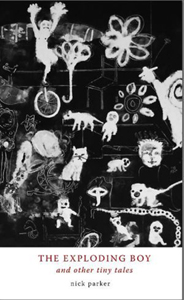
photo by Mysantropia
by Jonathan Pinnock
I think it’s time we had a conversation about humour in short stories. I get the feeling that it’s an area that some writers are uncomfortable with – perhaps because it’s so hard to pin down. Analysing humour can be a bit like dissecting your cat to find out why it’s purring: the process is messy, the chances of success are low, and the only thing that’s certain is that by the time it’s over, you’ll have a dead cat on your hands.
That isn’t to say that editors and judges aren’t looking for humour. Heidi Pitlor, an editor of The Best American Short Stories anthologies, wrote a piece in The Huffington Post last year in which she listed the qualities she’d like to see more of. ‘Humor’ appeared no less than four times in this list. This reminded me of Tracy Chevalier’s cri de coeur when she was judging the Bridport Prize back in 2007:
It was fascinating, if not a little dispiriting to find out what subjects people choose to write about these days. Certain themes recurred with almost monotonous regularity: aging and problems with elderly parents, suicide, road kill (yes, really!), illness, religious faith […] If only writers could be a little, well, jollier about it! Sorely missing from the entries was humour…
 We are conflicted about humour. We bemoan its absence, but when it turns up on our doorstep, we treat it with indifference. But the humorous writer has a whole kit of additional tools to bring to bear on a subject. Even the serious ones. Especially the serious ones. Which brings me to The Exploding Boy and Other Tiny Tales.
We are conflicted about humour. We bemoan its absence, but when it turns up on our doorstep, we treat it with indifference. But the humorous writer has a whole kit of additional tools to bring to bear on a subject. Even the serious ones. Especially the serious ones. Which brings me to The Exploding Boy and Other Tiny Tales.
The first time I encountered Nick Parker was at a reading for National Flash Fiction Day last year. I’d heard of ‘The Exploding Boy’, but I hadn’t followed it up, perhaps because it’s a small, self-effacing (indeed, self-published) book, and it didn’t seem to warrant any further attention. I was wrong.
Right from the off, I knew I was in for a treat. Here’s the opening of the very first story, which gives the collection its title:
We only call him the Exploding Boy now, of course; retrospectively. For most of last year he was known only as Ticking Boy, which wasn’t nearly so dramatic and led mainly to teasing by us, I’m ashamed to say.
A great example of creating tension by leaving a gap for the reader to fill, the single-page story that follows takes an absurd idea and follows it to its logical conclusion, and then a bit further. The premise of the story is never explained, nor does it need to be. In three hundred or so words, it explores subjects as diverse as bullying, ‘coolness’ and grief.
Some of the stories in the collection are even shorter than that. Here’s the entirety of ‘The People Next Door’:
We’ve been invited to supper by the people next door. It’s a bit awkward: we don’t call it supper, we call it ‘tea’. Though technically tea-time is about half five-ish, whereas we imagine supper is probably eight-ish, and more likely to involve wine. Also, the people next door are cannibals.
In case you’re wondering if Parker is incapable of writing a story that makes it onto a second page, there are a couple of longer stories that give him the opportunity to stretch out a bit. ‘The Boyle Curriculum’ is quite a tour de force, describing how a primary school teacher inflicts his obsession with his much more successful brother on his class:
“What kind of a man is my brother Boyle?” I said. The children listened without a whisper. “My brother Boyle is the kind of man who, if you rushed to him in a panic because your house was on fire, would make a great show of lending you his smallest bucket. You would snatch it from his hand and use it to douse the firestorm that was engulfing your home, but all the time what you’d really be worried about would be the safe return of his puny bucket.”
[…] Then Peter Mathers put up his hand and asked exactly what volume of fluid a ‘puny bucket’ could be expected to hold. I said, “about a chimneyful”, which shut him up.
 The narrator then leads his class in an increasingly demented sequence of activities centred around his brother’s supposed failings, culminating in a ‘field trip’ to spy on the man’s house and family. As an analysis of the futility, all-consuming nature and sheer childishness of sibling rivalry, you’d be hard-pressed to better it.
The narrator then leads his class in an increasingly demented sequence of activities centred around his brother’s supposed failings, culminating in a ‘field trip’ to spy on the man’s house and family. As an analysis of the futility, all-consuming nature and sheer childishness of sibling rivalry, you’d be hard-pressed to better it.
This is, first of all, a very funny book. But it’s also thought-provoking and unexpectedly profound. I don’t think there’s a weak story in the entire collection. What’s more, it’s small enough to fit into your coat pocket, so you can take it with you anywhere (try doing that with Lydia Davis’ Collected Stories). The Exploding Boy and Other Tiny Tales came out in 2011 and a second collection is well overdue. I hope that future books will attract the backing of a publisher because Parker deserves a much wider readership.


One thought on “Time to Talk About Humour”
Comments are closed.